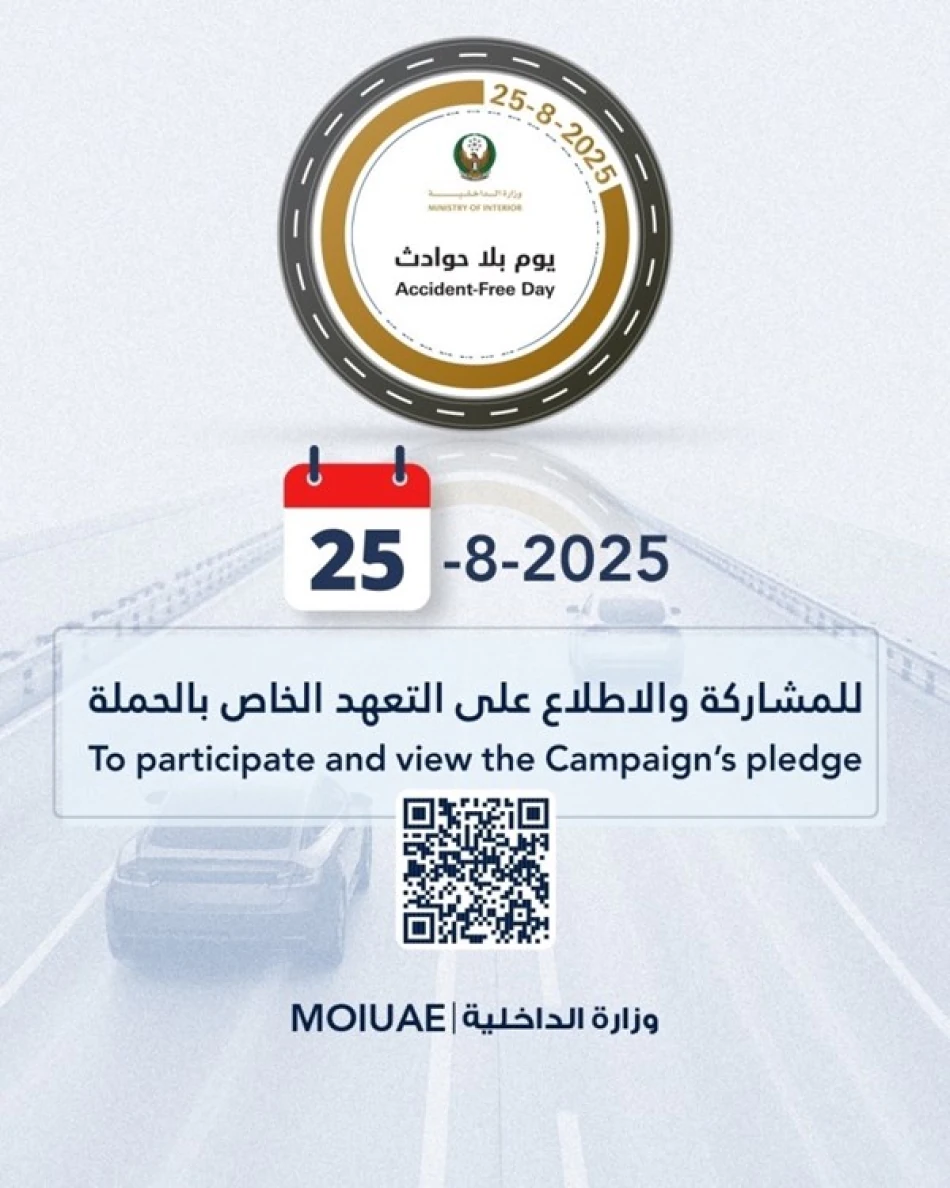
Safer Roads: Interior Ministry Launches "Accident-Free Day" Initiative
UAE Launches "Zero Accident Day" Initiative with Traffic Point Incentives
The UAE's Ministry of Interior has unveiled an ambitious traffic safety campaign offering drivers a tangible reward for road compliance: a four-point reduction in traffic violations for those who pledge to follow safety rules. Timed to coincide with the new school year starting August 25, 2025, the initiative represents a shift from punitive enforcement to positive reinforcement in road safety management.
Digital Pledge System Targets Behavioral Change
The "Zero Accident Day" initiative allows UAE residents to register online and commit to specific safety behaviors, including wearing seatbelts, maintaining speed limits, keeping safe following distances, respecting pedestrian rights, avoiding mobile phone use while driving, and yielding to emergency vehicles. Those who register before August 25 will automatically receive a four-point deduction from their traffic violation record on September 15, processed electronically without requiring visits to service centers.
This digital-first approach aligns with the UAE's broader smart government initiatives and reflects growing recognition that traditional enforcement alone may not be sufficient to address persistent traffic violations.
Strategic Timing Around School Safety
The campaign's launch coincides with the "Safe Academic Year" initiative, highlighting heightened concerns about child safety during school commutes. This timing is particularly significant given that back-to-school periods typically see increased traffic congestion and accident rates globally.
Colonel Engineer Hussein Ahmed Al Harthi, Chairman of the Federal Traffic Council, emphasized that the initiative specifically targets the first day of the school year to underscore the priority of ensuring student safety and creating a more secure road environment.
Incentive-Based Enforcement Gains Momentum
The UAE's approach mirrors successful behavioral modification programs implemented in other progressive jurisdictions. Singapore's safe driving incentives and various European "positive points" systems have shown measurable improvements in road safety outcomes, suggesting the Emirates may be adopting proven international best practices.
Unlike traditional penalty-focused systems, reward-based programs tend to generate higher public engagement and sustained behavioral change. The four-point reduction represents substantial value for drivers, as traffic points in the UAE can lead to license suspension and significant financial penalties when accumulated.
Technology Integration Streamlines Participation
The initiative's fully digital registration and automatic point deduction system demonstrates the UAE's advanced traffic management infrastructure. By eliminating the need for physical visits to service centers, authorities reduce administrative burden while encouraging broader participation.
This technological integration also enables real-time tracking of pledge compliance and program effectiveness, potentially providing valuable data for future road safety initiatives.
Broader Implications for Regional Traffic Policy
The program signals a maturation in the UAE's traffic safety approach, moving beyond enforcement-heavy strategies toward community engagement and shared responsibility models. Colonel Al Harthi's emphasis on "shared responsibility" for road security reflects growing recognition that sustainable safety improvements require cultural shifts rather than just regulatory compliance.
For other Gulf states grappling with similar road safety challenges, the UAE's initiative may serve as a template for balancing enforcement with positive incentives. The program's success or failure could influence regional approaches to traffic management and public safety campaigns.
The initiative's focus on community participation and digital engagement also positions it as part of the UAE's broader Vision 2071 goals, which emphasize citizen well-being and smart governance solutions.
Most Viewed News

 Layla Al Mansoori
Layla Al Mansoori






